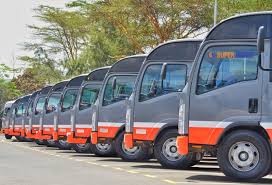The recent suspension of Super Metro’s operator licence by the National Transport and Safety Authority (NTSA) has drawn sharp criticism from the Matatu and Bodaboda Operators Federation, which has labelled the move unjust, disruptive, and detrimental to public transport operations in Nairobi and its environs. The suspension, which took effect following NTSA’s claims of multiple safety and compliance violations by the transport sacco, has sparked outrage among transport sector stakeholders who feel the authority acted prematurely and under public pressure.
Speaking during a press briefing held at Archives in Nairobi on Thursday, Kushian Muchiri, chairperson of the Matatu and Bodaboda Operators Federation, passionately defended Super Metro and called on NTSA to immediately reinstate the sacco’s licence. Muchiri argued that the suspension has not only disrupted daily operations but also left thousands of commuters stranded, particularly those who rely on the sacco for transport within the city and surrounding areas. According to Muchiri, the blanket suspension is a harsh measure that fails to take into account the significant role Super Metro plays in public transport, and he urged the NTSA board to reconsider its decision while investigations are ongoing.
Muchiri maintained that the federation stands in full solidarity with Super Metro and warned that they would consider taking industrial action if NTSA does not address their concerns promptly. He stressed that the authority should have allowed due process to take place before imposing such a sweeping penalty on the entire sacco. He further argued that a more constructive approach would have involved identifying specific vehicles or operators within the sacco that were non-compliant, rather than penalising the whole entity.
In its official communication, NTSA stated that the suspension was due to various safety violations, including expired inspection certificates for five vehicles, eight vehicles operating with expired Road Service Licenses (RSLs), and five others with expired speed limiter certificates. Moreover, the authority revealed that 88 vehicles were not transmitting speed data, 171 had no speed limiter records, seven had no vendor details for their speed limiters, and 109 vehicles were reportedly operating beyond the 80 kilometres per hour speed limit. NTSA insisted that the sacco must meet several compliance requirements before its licence can be reinstated.
In response, Super Metro representatives have contested the findings, arguing that the NTSA’s actions were influenced by mounting public scrutiny rather than a fair and detailed evaluation of compliance. They accused the authority of succumbing to pressure and unfairly penalising them without granting a chance to rectify any shortcomings. The sacco believes the decision was reactionary and overlooked the logistical difficulties that transport operators face in ensuring full compliance, particularly within the dynamic and often under-resourced public transport sector.
As part of the compliance demands, NTSA has directed Super Metro to present 294 vehicles for inspection at speed limiter vendors, submit 42 drivers for re-testing at the Likoni Driver Test Centre, and provide documentation proving remittance of statutory contributions such as PAYE, NSSF, and NHIF for its staff. The sacco has vowed to meet the conditions, but its supporters in the Matatu and Bodaboda Operators Federation remain adamant that NTSA must first allow it to resume operations to avoid further disruption to public transport. The matter continues to draw public attention as stakeholders await NTSA’s next move.

